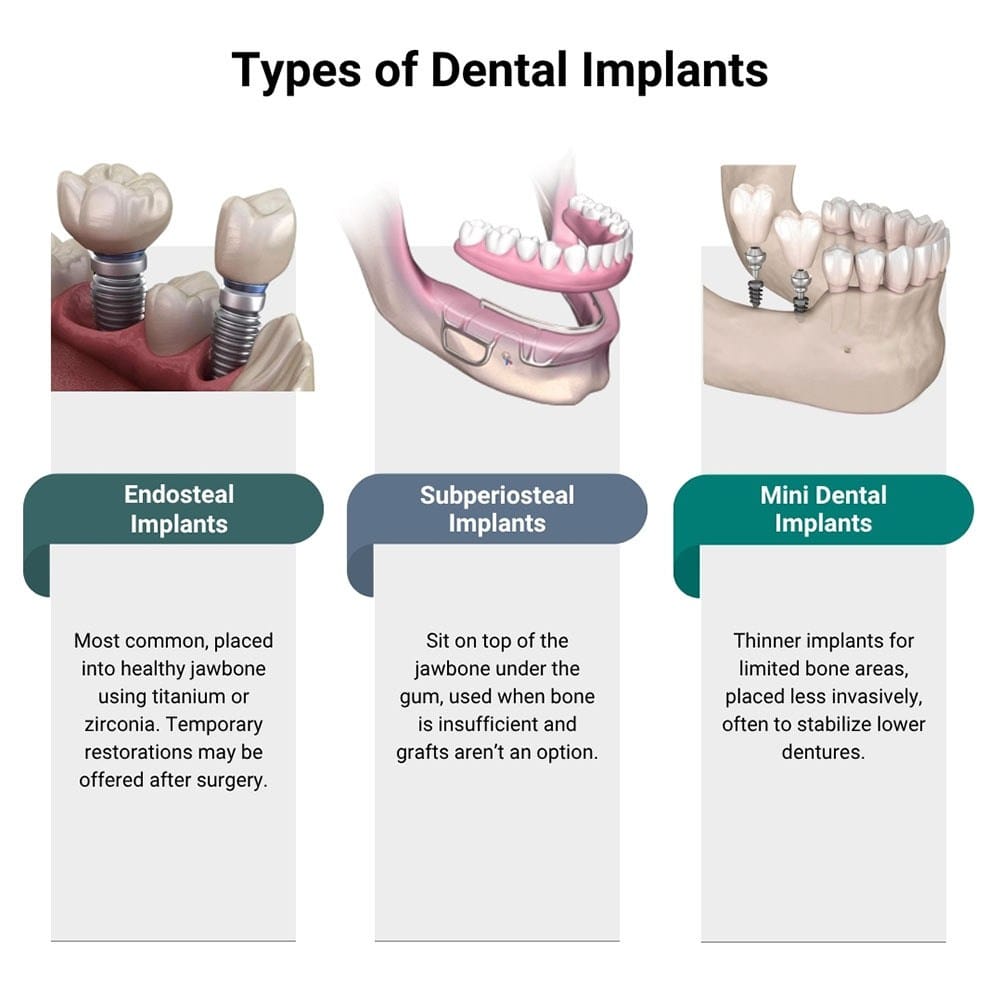Dental implants are artificial tooth replacements designed to be a long-term, often permanent, solution. They’re made of three components, including the implant post (or screw), which is placed into your jawbone.
At LuxDen Dental Center, located in Sheepshead Bay, Brooklyn, patients from nearby neighborhoods like Gravesend, Manhattan Beach, and Brighton Beach often ask how long implants last and whether they’re really permanent. Let’s break it down.
How Long Will a Dental Implant Last?
The implant screw works like an artificial tooth root. Once it’s placed in your jawbone, it fuses with the bone in a process called osseointegration. This bond creates a strong, stable foundation for your replacement tooth — and it’s designed to last many years, potentially a lifetime.
At LuxDen, we use 3D imaging and digital planning to place your implants precisely. After about 3 to 6 months of healing, the implant should be securely integrated with your bone. The other components — the abutment and final restoration — may be replaced over time if needed, but the implant post itself is intended to stay in place permanently.
What Are the Different Types of Dental Implants?
Endosteal Dental Implants
These are the most common implants used. A titanium or zirconia post is inserted into the jawbone.
The process involves:
- Numbing the area (with sedation available at LuxDen)
- Making a small incision to access the bone
- Placing the implant precisely based on digital scans
In some cases, a temporary restoration is placed soon after surgery — something our Sheepshead Bay team often discusses with patients during their planning visit.
Subperiosteal Dental Implants
These are used when there’s not enough healthy jawbone for a traditional implant and when a bone graft isn’t ideal. Instead of going into the bone, this implant sits on top of it, under the gum. They’re far less common but may be the right solution in certain cases.
Mini Dental Implants
Mini implants are thinner than traditional implants, making them a great option for areas with limited bone. They’re placed in a less invasive procedure, often right through the gum tissue.
Patients in nearby neighborhoods like Marine Park or Madison often choose mini implants for stabilizing dentures, especially on the lower jaw.

Why Might Dental Implants Fail?
Even though dental implants have a high success rate, certain factors can affect how long they last.
Poor Oral Care
Like natural teeth, implants need to be brushed and flossed daily. Skipping this can lead to peri-implant disease — a condition similar to gum disease. At LuxDen, our hygienists provide personalized care plans and cleanings to help keep your implants healthy.
Poor Jawbone Quality
If your jawbone isn’t dense or thick enough, implants may not anchor properly. That’s why we use advanced diagnostic tools like cone beam CT scans to evaluate bone health before starting any treatment.
If you’ve experienced tooth loss for a while, you might need a bone graft first — something we routinely perform at our Sheepshead Bay office.
Smoking
Smoking slows healing and increases your risk of implant complications. We strongly encourage our patients to quit smoking before and after surgery for the best results.
Medical Conditions
Some health issues can affect implant success, including:
- Diabetes
- Osteoporosis
- Bleeding disorders
- High blood pressure
Certain medications or past radiation therapy can also increase your risk of failure. During your consultation at LuxDen, Dr. Leonard Umanoff will review your medical history in detail to ensure implants are right for you.
Inexperienced Implant Dentist
Experience matters. Implants that are placed poorly or restored too soon can fail. At LuxDen Dental Center, Dr. Umanoff brings years of specialized training and advanced technology to every case, ensuring predictable, long-lasting outcomes.
What Can Be Done If an Implant Fails?
Signs of a failing implant include redness, swelling, bleeding, or movement around the implant. If you notice any of these, schedule a visit right away.
Our team in Sheepshead Bay can assess the situation using digital imaging and decide whether the implant can be saved. If it needs to be removed, we’ll talk through your options for replacement — including bone grafting or alternate implant systems.
Choosing the Right Brooklyn Implant Dentist
Choosing an experienced implant provider is essential to achieving permanent results. LuxDen Dental Center serves Brooklyn neighborhoods including Gravesend, Mill Basin, and Manhattan Beach. We’ve helped thousands of patients restore their smiles with modern dental implants, from single teeth to full-mouth solutions.
Ready to Learn More?
If you’re considering dental implants and want personalized advice from a trusted Brooklyn implant dentist, visit LuxDen Dental Center near Coney Island Avenue and Avenue Z, just minutes from Kelly Park and James Madison High School. Call (718) 717-8866 today to schedule your consultation and take the first step toward a stronger, healthier smile.
